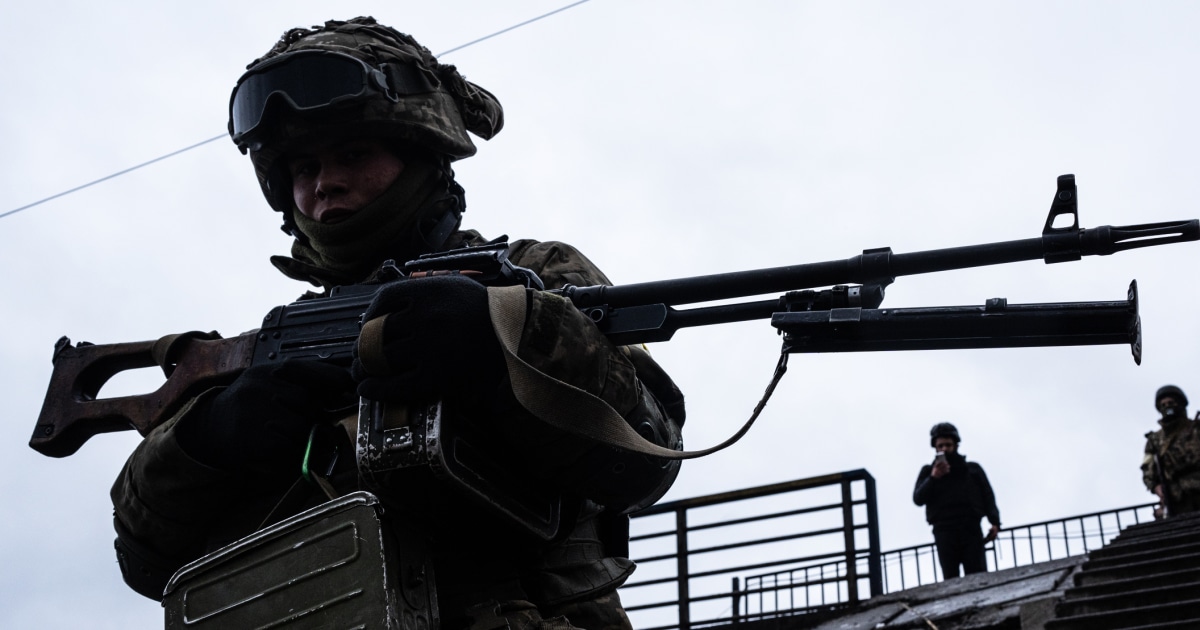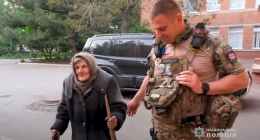
The U.S. is not sharing some of the most sensitive intelligence that could enable lethal strikes against the Russian military by Ukrainian forces, in part over concerns about being seen as a direct participant in the war, the Democratic chairman of the House Armed Services Committee said Thursday.
The remarks by Rep. Adam Smith of Washington shed new light on a controversial question the Biden administration has declined to address directly.
Officials say the U.S. has long shared intelligence with Ukraine and continues to do so, but lawmakers say the issue of helping the Ukrainian forces with targeting information for deadly attacks is one of the many difficult quandaries officials confront as they try to help Ukraine fight off a Russian invasion without becoming embroiled in a military conflict with a nuclear-armed superpower.
“We want to support the Ukrainians in every way we possibly can, without going to war with Russia,” Smith said on MSNBC’s “Morning Joe.” “When it comes to intel-sharing and targeting, that’s a fine line.”
The U.S. is providing some intelligence to Ukraine, he said, but not “real-time targeting.”
“We’re not doing that, because that steps over the line to making us participating in the war. So the Pentagon is really struggling and walking that very fine line,” he said.
White House press secretary Jen Psaki did not directly refute Smith’s comments.
“We’ve consistently shared a significant amount of detailed and timely intelligence on Russia’s plans and activities with the Ukrainian government to help Ukrainians defend themselves,” Psaki said, adding at another point that the U.S. has shared intelligence that Ukrainians “can use to inform and develop their military response to Russia’s invasion.”
Psaki said she could not get into further details.
Later Thursday, Smith’s spokesman praised the Biden administration’s handling of the Ukraine situation without walking back his remarks about intelligence-sharing.
“As the chairman has previously stated, he believes the Biden-Harris administration is doing everything it can to rally allies and partners around the world to support the Ukrainians and hold Vladimir Putin and his cronies accountable,” the spokesman, Caleb Randall-Bodman, said in a statement. “These efforts have included humanitarian assistance, strong economic measures, and military and intelligence aid — all of which he supports. The intelligence provided to the Ukrainians is rapid, and can be used to defend their country.”
The Biden administration has provided hundreds of millions of dollars in military aid to Ukraine, including Javelin anti-tank missiles and shoulder-fired Stinger anti-aircraft missiles. Administration officials have said they will continue to ship weapons to help Ukraine.
Smith’s description of withholding lethal targeting information was consistent with other remarks this week by lawmakers, all of whom are receiving regular classified briefings.
Biden administration officials pushed back against those earlier remarks Tuesday, saying there were no legal or policy impediments to sharing intelligence.
National security adviser Jake Sullivan said no White House decisions had impeded intelligence-sharing, and Pentagon spokesman John Kirby said intelligence-sharing “is not being held up — either previously or now — because of legal concerns.”
Several U.S. officials briefed on the matter said the concern about being considered a “co-belligerent” is not the only impediment to getting battlefield intelligence in the hands of the Ukrainians in real time.
Russian intelligence is monitoring Ukrainian communications, so there are worries about security, they said, and about compromising U.S. sources and methods. Ukrainians cannot always act on the information, they added.
There also may not be much intelligence to share, because the U.S. military is not flying overhead and has no boots on the ground — although the CIA still has a network of human sources in Ukraine watching Russian military movements, officials said.
“We should lean forward in providing actionable intelligence,” Marco Rubio of Florida, the ranking Republican on the Senate Intelligence Committee, said Wednesday on CNN. “There are a couple factors to keep in place. Number one, can it be communicated in a secure way? And to be actionable, it has to be accurate. A lot of times people think intelligence is just as black or white. Oftentimes it is an assessment, a highly educated guess. You don’t want to make a mistake, especially since the Russians have shown the ability to adjust tactics.”
Sen. Mark Warner of Virginia, the Democrat who chairs the Intelligence Committee, told NBC News’ Hallie Jackson on Tuesday that he is satisfied with the level of intelligence-sharing.
“We are sharing intelligence with Ukrainians as quickly as possible,” Warner said. “We also have to realize, unfortunately, many of the Ukrainian services have been penetrated by the Russians over many years, so we have to protect our sources and methods.”
“We are doing all we can to help the Ukrainians in real time,” he said.
Rubio said that given the Ukrainians’ limited resources, “you don’t want them chasing one thing when in fact things change on the ground and they find themselves in the wrong place. So there is some complexity, but generally speaking, I share concerns that some of that [intelligence] may not get there fast enough. But even today, there has been work done to make sure unnecessary impediments are removed.”
Rep. Mike Rogers of Alabama, the ranking Republican on the Armed Services Committee, was more critical.
“That a Biden policy decision was made to withhold real-time intelligence, which would better equip Ukrainians to defend themselves, is a sin on this White House I doubt history will forgive,” he said in a statement Thursday.
Earlier in the week, a Republican on the Senate Intelligence Committee, Ben Sasse of Nebraska, blasted the Biden administration for what he said was a “lawyerly” approach and a failure to share lethal targeting intelligence with the Ukrainian forces.
“We are not getting Ukrainians enough lethal targeting intelligence, and we’re not getting it to them fast enough,” Sasse said.
“I don’t know what process BS Sullivan is hiding behind — lethal targeting intel needs to go to Zelenskyy so he can defend his country,” he said, referring to the national security adviser and to Ukrainian President Volodymyr Zelenskyy.
In an interview Tuesday on NPR, Sasse, who attended a classified briefing Monday night on Ukraine, complained that administration lawyers had been delaying the passing of crucial intelligence.
“They need to be sending more actionable intelligence in real time to the Ukrainians,” Sasse said, “because we’re not moving fast enough. Knowing where a Russian tank was 10 hours ago isn’t very helpful to a Ukrainian who is fighting to defend his or her family.”
The U.S. is sharing intelligence, Sasse said, “but we have lawyers delaying the process at way, way too many steps, and we shouldn’t be letting technicalities get in the way of helping the Ukrainians fight back.”
He added: “Putin threatens that real-time actionable intelligence is tantamount to being engaged in the war in their soil. That’s obviously not true. … We need the Ukrainians as deadly as possible as fast as possible so they can protect as many civilians as possible.”
He said the Biden administration process was “way too lawyerly,” adding: “We have a very limited window here. We need to do it fast. We need to do it now.”
In response, Sullivan said it was “absolutely false” that any White House or National Security Council lawyers had taken any steps to block the sharing of intelligence with Ukrainians. “It’s just not true,” he said.
Sullivan declined to comment on whether actionable intelligence was being shared, because the specifics are classified.
Geoffrey Corn, an expert on the law of armed conflict at the South Texas College of Law in Houston, said the Russia-Ukraine situation highlights a contradiction in international law between long-standing principles of neutrality and the collective right of self-defense that was established in the U.N. Charter after World War II.
The act of providing weapons to one side of a conflict, as the U.S. is doing with Ukraine, violates the international law of neutrality as it existed before World War II, Corn said. But under the U.N. Charter, every country in the world has a legal right to use force to defend Ukraine from an invasion by Russia, he said.
In 1986, the International Court of Justice held that U.S. support for rebels fighting to overthrow the Sandinista government of Nicaragua violated international law.
The court found that “a number of operations [by the Contra rebels] were decided and planned, if not actually by United States advisers, then at least in close collaboration with them and on the basis of the intelligence and logistic support which the United States was able to offer.” That went beyond simply providing arms, the court noted.
A congressional official said, “It’s one thing to give somebody a rifle, and it’s another to tell him where to shoot it.”
The Reagan administration ignored the international court ruling.
But 36 years later, Biden administration officials have told Congress they are concerned about crossing a line that could give Russia a pretext to retaliate against the U.S., congressional officials said.
Source: | This article originally belongs to Nbcnews.com










